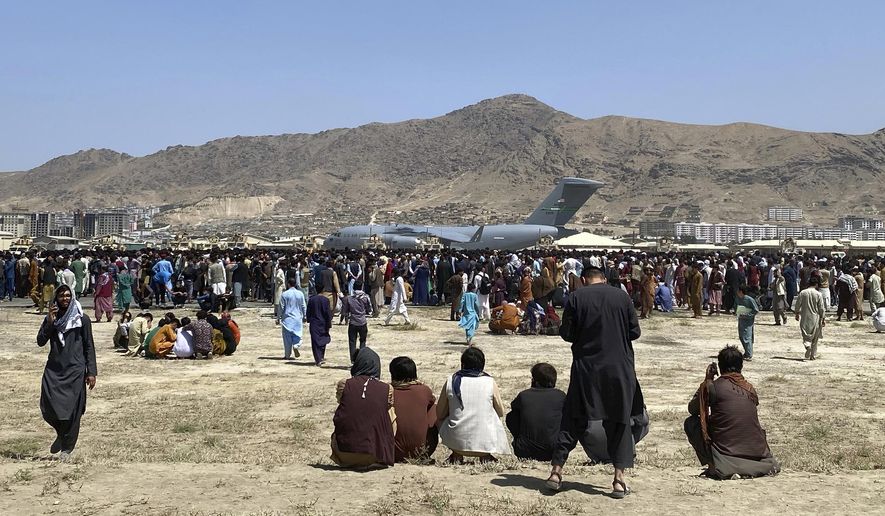A bipartisan group of lawmakers has introduced legislation aimed at introducing a pathway to citizenship for thousands of refugees admitted to the U.S. under temporary immigration status amid the chaotic withdrawal from Afghanistan last year.
The bill, introduced in the Senate on Tuesday, would also improve and expand the process for obtaining Special Immigrant Visas, a problem-plagued program designed for Afghans who assisted the United States throughout the 20-year war.
“These evacuees are people who stood by our service members, risking their safety and the safety of their loved ones, in support of the U.S. mission in Afghanistan,” said Sen. Roy Blunt, Missouri Republican. “This bill maintains a rigorous vetting process while providing an opportunity for Afghan refugees to rebuild their lives in America.”
Mr. Blunt was joined by Sens. Amy Klobuchar, Minnesota Democrat, Lindsey Graham, South Carolina Republican, Christopher A. Coons, Delaware Democrat, Lisa Murkowski, Alaska Republican, and Richard Blumenthal, Connecticut Democrat.
A companion bill was introduced in the House by Reps. Peter Meijer, Michigan Republican, and Earl Blumenauer, Oregon Democrat.
The U.S. evacuated nearly 77,000 Afghans last year in a frantic operation that began just weeks before Kabul fell under Taliban rule. Many of those evacuated were granted humanitarian parole, which allows them to stay in the U.S. for just two years.
SEE ALSO: Taliban’s Afghanistan goes back to the future one year after U.S. leaves
Under current law, the only pathway for these Afghans to receive permanent legal status is through seeking asylum or by applying through the Special Immigrant Visa program.
The proposed legislation would entitle those admitted under humanitarian parole to undergo additional vetting and apply for permanent legal status.
The bill is modeled after laws previously passed by Congress in the wake of similar humanitarian crises, including after the Vietnam War.
Some lawmakers have been critical of the vetting of refugees admitted to the U.S. during the haphazard Afghanistan withdrawal.
Citing whistleblower claims, Republican Sens. Josh Hawley of Missouri and Ron Johnson of Wisconsin, said last week that hundreds of Afghan evacuees reached the U.S. despite appearing on a Defense Department and counterterrorism watchlists.
The lawmakers said they were told that 324 Afghans reached the U.S. despite appearing on the Pentagon’s Biometrically Enabled Watchlist.
They also said a whistleblower claimed that political appointees ordered military officers to “cut corners” on fingerprint checks on evacuees and that Department of Homeland Security officials were told to delete some biometric data if it was out of date.
In addition to extending permanent status to humanitarian parolees, the new bill would also expand the Special Immigrant Visa program to groups of Afghans that have previously been excluded including those who served in the Afghan National Army Special Operations Command.
The bill would also develop a task force to improve processing under the program and require the State Department to report to Congress on the status of Special Immigrant Visa applications.
Several veterans and refugee advocacy groups, including Iraq and Afghanistan Veterans of America, Veterans for American Ideals and the International Refugee Assistance Project, have endorsed the bill.
“As we reflect on the last year without a U.S. presence in Afghanistan, it is clear that our mission there is not yet complete,” Mr. Meijer said. “I am proud to help lead this bipartisan, bicameral effort to enhance security vetting procedures, support our allies overseas, and keep the promises we made to our Afghan partners by providing a pathway for them to obtain legal status to stay here in the United States. Our credibility with our allies and our moral standing in the world depend on the completion of this mission.”
• Joseph Clark can be reached at jclark@washingtontimes.com.




Please read our comment policy before commenting.